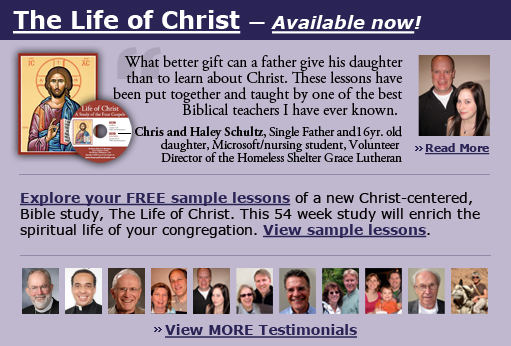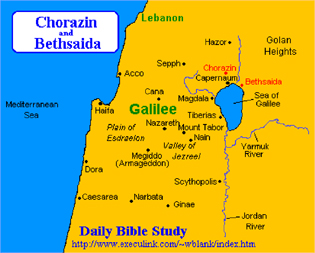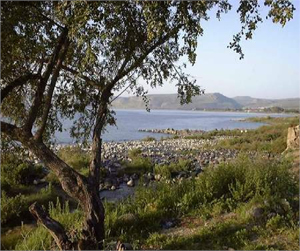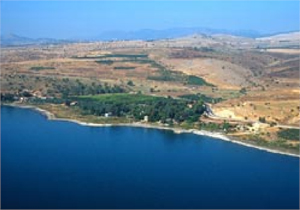
Christmas
Easter
Pentcoest
All Saints
Christ The King
Confirmation
Palm/Passion
Reformation
Stewardship
Books of the Bible
Lenten Series
Christmas Dramas
Videos
Series A - Matthew
Series B - Mark
Series C - Luke
Series D - Other
To contact
Edward F. Markquart
info@sfs.com

Series B Pentecost 6B Mark 6:30-34, 53-56 This Bible study is from THE LIFE OF CHRIST: A Study in the Four Gospels. This free 54 week course for the laity will be available for congregations beginning in 2005. Basic text for the course: SYNOPSIS OF THE FOUR GOSPELS, Kurt Aland, English Edition, P. 135-136. Introductory Comments In Mark’s sequence of the Jesus narrative, Jesus had been run out of the synagogue. It is Luke who tells us that this synagogue was in Nazareth, the town of Jesus’ childhood. But Mark does not mention Nazareth. The Gospel of Mark tells us that the conflict in the synagogue was in his “own country.” After this confrontation, Jesus immediately sent out his disciples, in pairs, on their first missionary trip. Then, we hear the story that John the Baptist had been brutally executed. After that report, the disciples return from their first missionary journey and are excited to share the news of their journeys. Jesus then invites his disciples out into the wilderness to rest a while. The crowds hurry on ahead of Jesus and his disciples and arrive in the wilderness before them. Jesus looks on the hurrying crowds like the people were sheep without a shepherd. They were “coming and going” and “didn’t’ even have time to eat a leisurely meal.” In America today, we, too, are living in a rat-race culture where we are forever coming and going and don’t even have time to rest or eat a leisurely meal. We are a fast paced society in a fast food world. The appointed Psalm for this Sunday is Psalm 23 and the words from Psalm 23 speak to our rat-race culture that needs to rest because of all the comings and goings in our lives. It is also helpful to examine the geographical setting of the story for today’s gospel lesson. The setting for today’s gospel lesson is the same as for Jesus feeding of the five thousand and walking on water. Those two events (feeding of the five thousand and Jesus walking on water) are omitted in today’s gospel lesson, but the scene is the same. Examine the map below. Jesus may have traveled from Nazareth and its synagogue to the city of Tiberias on the Sea of Galilee, and then sailed across the lake to his own adult hometown of Capernaum. From Capernaum and the region of Bethsaida, Jesus may have gone into the remote wilderness near Tagbha where he fed the five thousand.
http://www.christiananswers.net/bibleplaces/home.html The picture below is a fantastic photograph and needs to be memorized in order to remember many of the most important geographic locations in Jesus’ life. (This photograph will be repeated often in this course.) Find and focus on the location of Tabgha, the traditional location of the feeding of the 5000. It was a remote, lonely area. Tabgha is known as the traditional sight at which Jesus did the miracle of the feeding of the 5,000. The Biblical text is definite that the feeding of 5,000 was in a remote and lonely place, away from villages and away from places to obtain food. The Gospel of Luke explicitly tells us it was in the remote area of the village of Bethsaida. Some Biblical scholars conclude that Jesus was not in the village of Bethsaida but in the region of Bethsaida. Below, see the peaceful scene of Tagbha today.
http://www.rc.net/wcc/israel/lakegal4.jpg
http://www.ancientsandals.com/overviews/tabgha.htm Tabgha - location and profile
30 The apostles The apostles of the eyewitness of Jesus, those people who associated with Jesus in the flesh, those people who were the original twelve disciples. The word, “apostle,” means “sent” and the twelve disciples had been sent out on their first missionary journey. Christians are always apostolic people. We are always sent out into the world around us. We are not to sit back in our churches, our homes, our comfortable enclaves but we are sent into the communities, towns and villages around us with the message and power of the gospel. gathered around Jesus, Followers of Christ always gather around Jesus. Jesus is the center, the focus, the core, the axis, the hub of the Christian church. We always gather around Jesus. Jesus is our center. and told him all that they had done and taught. It is almost as if the first disciples were like children, wanting to come back and report to their master what they had done and taught. They wanted to share with Jesus what had happened. We enjoy sharing good news with people who are authority figures in our lives, and who send us out to do a task. These first disciples wanted to share their good news with their mentor and teacher. 31 He said to them, "Come away to a deserted place all by yourselves and rest a while." After Jesus listened to his disciples, he suggested that they go away to a deserted place all by themselves for a while. And rest. By themselves. They had been enormously busy. They had been preaching and healing and sharing the gospel and participating in people’s lives. Now it was time to take a breather, go away and be alone and rest. For many were coming and going, and they had no leisure even to eat. We could underline this sentence because these words so accurately describe our lives here in America or wherever we live which has become a rat-race. We know how busy we all are, with all our comings and goings, so much so that we don’t even have time to eat. Underline the phrase, “had no leisure even to eat.” Tell stories about similar experiences in your own life and the life of your family and friends. Fast food stores have become the norm of America. We find fast food chains on every street corner. Why are fast food stores so popular at this time in the history of America? Because most of us are busy, busy, busy. And think about the “drive through” windows of the fast food restaurants? The cars are lined up. Years ago, there were no “drive through lines” in America and now they are common as can be. We don’t have leisure to eat. We eat in our cars, gulping down our food, while driving to the next point on our “check list” for the day. 32 And they went away in the boat to a deserted place by themselves. We can see the disciples getting into a boat, a large boat that would accommodate them all, and they were going to a deserted place by themselves. That is what many people in America would like to do: to go to a deserted place apart from telephones, cell phones, computers, radios … to go such places with our closest family and friends. Jesus was their shepherd, their leader, their guide and Jesus knew that it was time for his disciples to rest and recuperate, and be alone in the wilderness. In the twenty-third psalm, the shepherd leads his flock to lie down in green pastures and sit beside still waters and thereby restores their souls. Jesus was the good shepherd who was leading his disciples out for rest. Good shepherds are good leaders in our lives. Good shepherds are not merely pastors although the word, “pastor,” is a Latin form of the word, “shepherd.” Good shepherds are any leaders and caretakers in our lives who insist that we need times and spaces for pure rest. 33 Now many saw them going and recognized them, and they hurried there on foot from all the towns and arrived ahead of them. But did it happen? The rest? The time apart with the disciples? We meet the crowds again, great crowds. We will meet the crowds again and again in the gospels. The crowds symbolize people who are in a hurry. Circle the word, “hurried,” in the text. The crowds are forever hurried. They symbolize hurry. Rushing, scurrying, dashing, scampering, bustling. 34 As he went ashore, We assume that Jesus came on shore about the geographical location of the feeding of the 5000. Near Tabgha. he saw a great crowd; In the next story, Jesus fed the five thousand.Circle the word, “great,” and write in the words, “5000 plus women and children.” and he had compassion for them, Circle the word, “compassion,” and remember that Jesus had the compassionate mind and heart of God within him. That is the way that God feels towards you and me and to crowds to people who do not necessarily believe in him: compassionate. The word, “compassion,” in Greek implies feelings “coming from the bowels,” from deep within us. The Latin is: Com = with. Passio = suffering. With suffering. With passion. With compassion for the others. It is empathy, the feeling for people in their suffering situations and times of life. because they were like sheep without a shepherd; Underline, “sheep without a shepherd.” This also becomes a primary metaphor of Jesus. Jesus is the Good Shepherd and we are the sheep whom Jesus cares for, feeds, waters, protects, and leads on the wise paths of life. The sermon for today could focus on Psalm 23 and its images of a compassionate shepherd. and he began to teach them many things. Underline, “he began to each them many things.” In this course, we have been recently studying the parables and miracles of Jesus. Jesus continues to teach us many things today. Jesus wants to still teach us about life, love, eternal life, and eternal love. Jesus wants to teach us about faith and trust in the power and goodness of God. Jesus wants to teach us about the cross and the way of sacrifice and sacrificial love. Jesus wants to teach us about the dangers of following the crowd, the great crowds, who are really lost, harried, hassled and hurried, and don’t know the way of life and love and giving of one’s self to others. Jesus wants to teach us about the necessity of rest. (The lectionary planners then delete the two stories about Jesus feeding of the five thousand and walking on water. Those stories will be the gospel text for next week and told from the point of view of the Gospel of John.) 53 When they had crossed over, they came to land at Gennesaret and moored the boat. Gennesaret is not a city but a lake. This is another way of saying, “the land near the Lake of Gennesaret.” See Luke 5:1, “He was standing by the lake of Gennesaret” which means he was standing by the lake/sea of Galilee. The “they” who crossed over the lake was Jesus and his disciples. Notice the detail in Mark’s gospel. We have repeatedly said that Mark’s gospel is a graphic gospel. The Gospel of Mark has the feeling of stories that are being told by an eyewitness (Simon Peter.) We are forever encountering Peter’s vivid and explicit descriptions in this gospel e.g. “they moored the boat.” 54 When they got out of the boat, people at once recognized him, Jesus had become mighty popular after his feeding of the five thousand. Folks knew where to find free food. 55 and rushed about that whole region and began to bring the sick on mats to wherever they heard he was. The crowd rushed to Jesus. Circle the word, “rushed.” It goes with the word, “hurried.” The crowd, knowing that they had been given free food during the feeding of the five thousand, now wanted and expected healings. Jesus, rather than putting the crowd down for following him for the wrong reasons, had compassion on the crowd. He knew they poverty; he knew their illness and he wanted to make them well. 56 And wherever he went, into villages or cities or farms, they laid the sick in the marketplaces, and begged him that they might touch even the fringe of his cloak; and all who touched it were healed. We know that Jesus had become a popular healer of bodily ailments and this was a sign that the Messianic Age had come, that the Messiah who was foretold in the Old Testament had finally arrived. In the previous story about the feeding of the 5000, we discovered that a result of that miraculous feeding was that the crowd wanted Jesus to become a “bread king” for them. In this story, we discover that the crowds wanted Jesus to become a “healing king” for them. People wanted free bread and people wanted free healing. But the crowds did not especially want the kingdom and nor the king. Even so, Jesus had compassion on them. We recall the story of the woman who had experienced menstrual bleeding for twelve years and how she had such deep faith. That woman only wanted to touch the fringe of Jesus’ garment and she knew she would be healed. |



